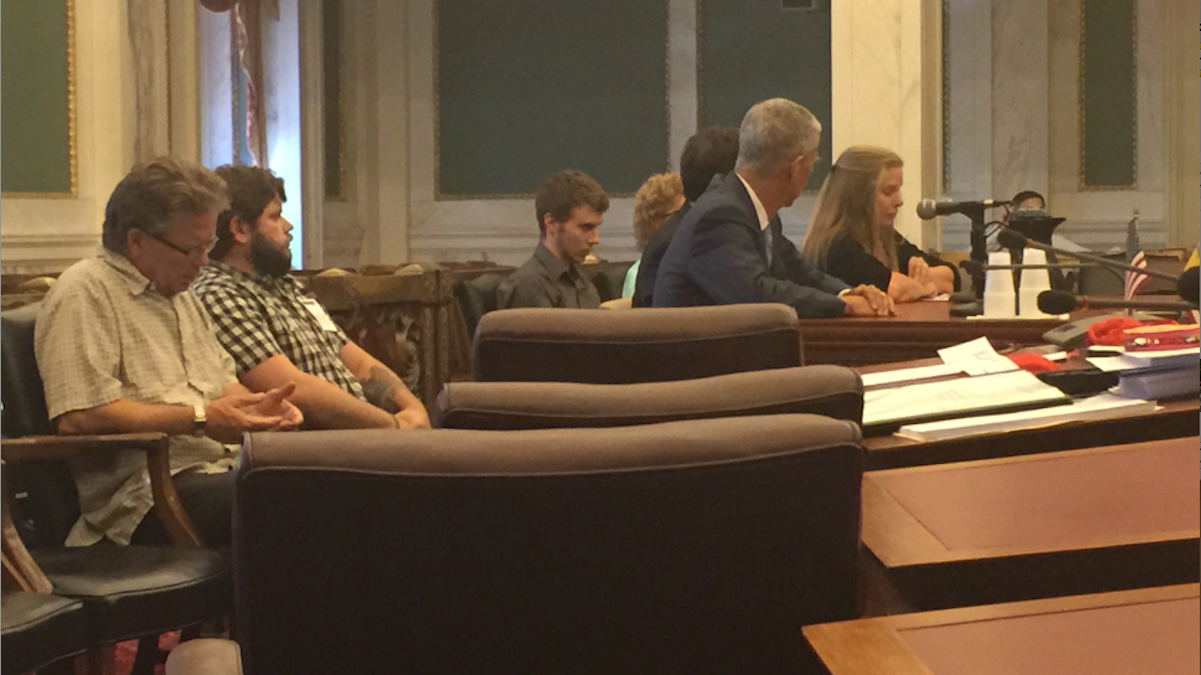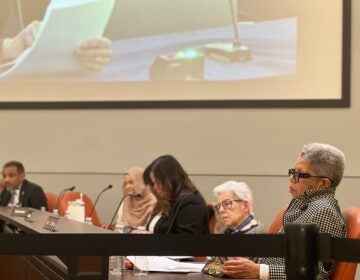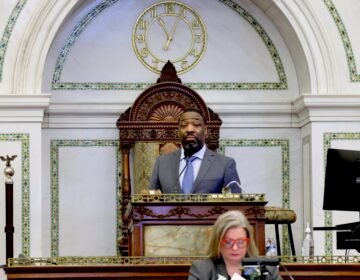Shane Montgomery’s mother urges Council to pass bill requiring cameras outside city bars
Listen
Karen Montgomery, whose 21-year-old son, Shane, died after leaving a Manayunk bar early Thanksgiving morning, testifies before a City Council committee hearing on Monday. (Brian Hickey/WHYY)
Karen Montgomery sat at a table inside City Council chambers on Monday afternoon and explained why she thinks a bill requiring bars and restaurants that serve alcohol to install surveillance cameras outside each public exit should become law.
Her words were steeped in the tragedy of losing her son Shane, who vanished after leaving Kildare’s Irish Pub on Main Street in Manayunk around 2 a.m. Thanksgiving morning. Shane’s body would be found in the nearby Schuylkill River after weeks of tireless searching by loved ones, strangers and police.
Montgomery saw the proposed cameras not as a safeguard, but an aid that was sorely lacking when she needed it most.
“One thing that shocked and frustrated us was the lack of video surveillance along this bustling corridor where many businesses are geared toward late-night activities,” Montgomery told members of Council’s Public Safety Committee, while fighting back tears. “After weeks of fruitless searches and unspeakable anguish, one camera was discovered that finally provided the first clue toward the recovery of our beloved Shane.
“It is my wish that Council require establishments to install and maintain a working camera outside their facilities. I have no delusions that any camera would have saved my Shane. However, I am convinced without a doubt that had video shown his direction upon leaving his last stop, the suffering endured during searches without direction would have been lessened.”
What it’s all about
The “Shane Montgomery Bill,” which “would require every special occupancy licensee to install a surveillance camera outside each public exit,” was the subject of the hearing chaired by City Councilman Curtis Jones Jr., in whose district Montgomery went missing.
When he proposed the bill in February, Jones concurred with Karen Montgomery in saying cameras couldn’t have saved the 21-year-old who apparently fell into the Manayunk Canal, but could have helped answer many questions during the weeks of investigation into his disappearance.
Monday’s hourlong meeting wasn’t held to decide whether to forward the bill to the floor for a Council vote; rather, it was intended to start a conversation about its merits.
Testifying were Montgomery, Philadelphia Public Safety Director Michael Resnick, Sande Friedman (on behalf of the Pennsylvania Restaurant & Lodging Association’s Philadelphia chapter) and Shanin Specter, an attorney representing a 33-year-old woman who was sexually assaulted inside a garage at 17th and Callowhill streets.
Testimony supporting the bill
From a pro-camera perspective, Resnick noted that such technology has been eminently helpful to investigators in the city.
Among the cases that, according to Resnick, surveillance footage helped crack were the homicide of police Officer Moses Walker, the Germantown abduction of Carlesha Freeland Gaither and the murder of CHOP Dr. Melissa Ketunuti.
Resnick cited initiatives including the DIVRT (Digital Imaging Video Recovery Team) and SafeCam in making his case.
“Since the inception of these initiatives, there have been approximately 1,700 videos released to the public, which has led to approximately 450 arrests and 750 investigations cleared,” he said. “Videos released by the Philadelphia Police Department have been viewed over 7.6 million times via the department’s YouTube site.”
Resnick noted that footage from the cameras, which would face the street from the establishment, would not create livestreams constantly monitored by police. Rather, “investigators will only contact owners with a request to recover video if a crime or incident occurs in that area,” he said.
From his perspective, Specter deemed it “shocking in 2015 that parking garages are not required to have video cameras” and said he’s been in talks with Parkway Corp. President Robert Zuritsky in the hopes of presenting a joint proposal to reform the code in regards to parking garages.
Questions and specifics
Friedman said her group has numerous concerns over the intention, cost and implementation of such a program despite appreciating “the spirit behind” the bill, which plays into the existing Business Security Camera Program.
“This legislation takes what should be a business decision and turns it into a government decision through mandate,” she said. “This legislation does not take into consideration the impact it would have on the restaurant community or the business community at large.”
She cited logistical, cost and public-opinion concerns.
“[It] targets the hospitality industry, restaurants specifically, to implement yet another fiscally burdensome mandate at a time where taxes are rising and other government mandates are going into effect,” Friedman said.
Responding to those concerns, Jones noted that a price can’t be placed on safety but that businesses getting such cameras could see reduced insurance rates as a result.
When asked about privacy concerns before the hearing, Jones told NewsWorks that, “Post 9/11, common spaces have become common and we’ve used technology.
“We have 4,000 cameras, as we speak right now, at universities, SEPTA or the city itself, all of which feed into a ‘Real Time Crime Center.’ What we want to do is connect that with the small businesses out there so that we have a sense of safety. Nobody wants to invade, in ‘1984’ terms, people’s privacy. But you have a right to come home at 2 in the morning and have a sense of safety, too.”
He said that the time is right for a public/private partnership to “keep citizens safe,” noting that “rebates” are already available to help alleviate the financial burdens on businesses.
The timing of the hearing wasn’t coincidental. It was meant to be held during the budget season, as Council has sought an extra $250,000 to put into that program. If it ultimately passes, it would be a roll-out as opposed to setting a deadline for all businesses to comply.
“I think we’re at the point where this needs to be discussed,” he said. “So, let’s start the dialogue.”
The back story
Montgomery vanished Nov. 27 (Thanksgiving) after leaving Kildare’s Irish Pub on Main Street around 2 a.m., and little evidence surfaced afterwards.
Philadelphia police and FBI agents interviewed neighbors. The Philadelphia Police Department’s Marine Unit methodically combed the Manayunk Canal. Week after week, neighbors roamed the area.
Eventually, the search zeroed in on the Schuylkill. Surveillance footage recovered from a nearby nail salon showed Montgomery walking near a footpath a parking lot away from a steep riverbank.
On Dec. 21, divers with the Garden State unit found Montgomery’s keys in the water. The body of the the missing West Chester University senior was recovered about two weeks later in a frigid swath just feet from the Manayunk Brewery, located down the street from the bar where he was last seen.
“My Shane could have been anyone’s child, grandchild, cousin or friend,” Karen Montgomery said in concluding her testimony on Monday. “I respectfully request that you prevent another family from this unspeakable horror and pass Shane’s bill.”
No formal action was taken on the measure when the hearing ended around 2:30 p.m. Monday. It remains on hold for further discussion.
WHYY is your source for fact-based, in-depth journalism and information. As a nonprofit organization, we rely on financial support from readers like you. Please give today.




